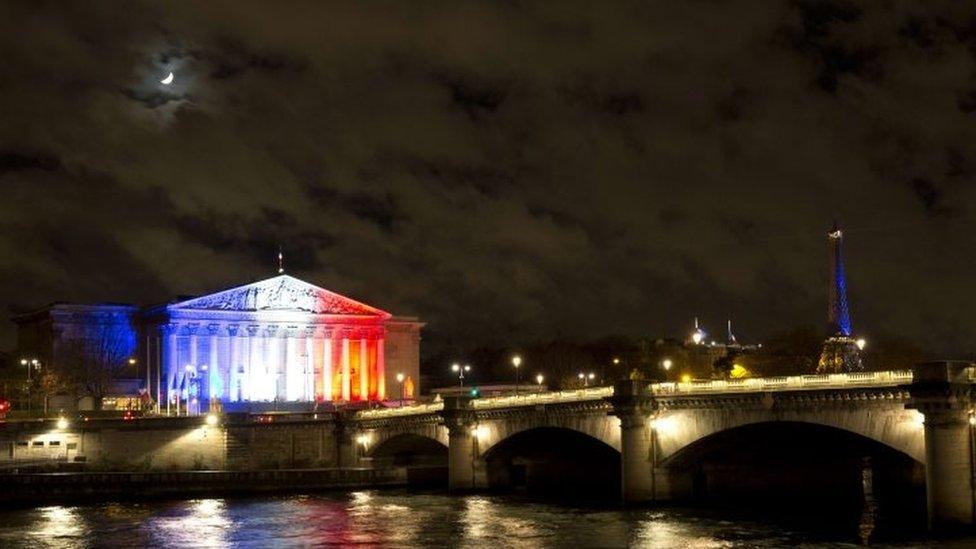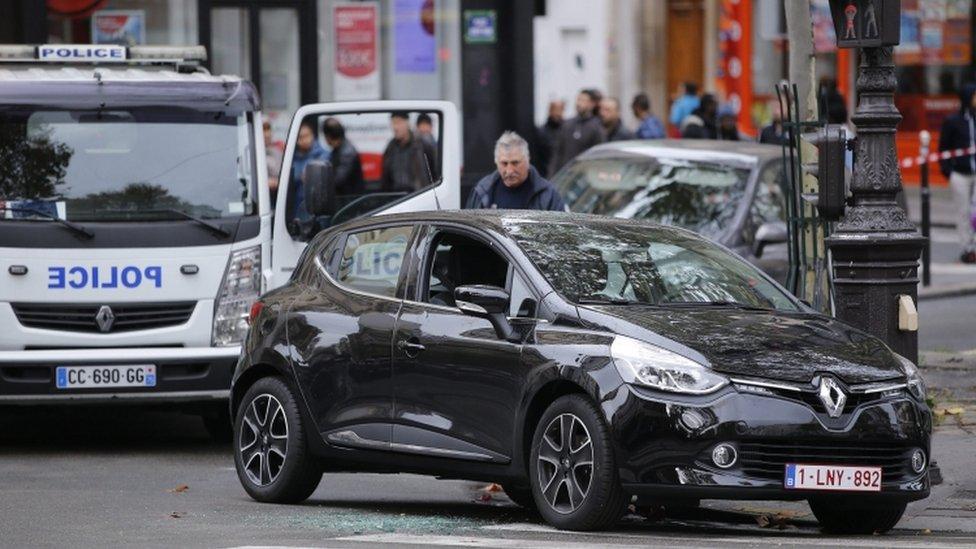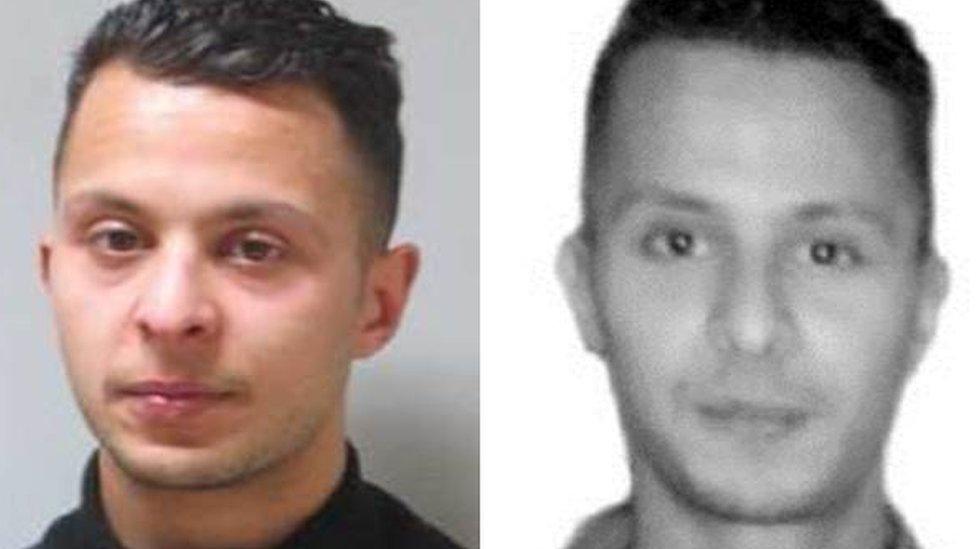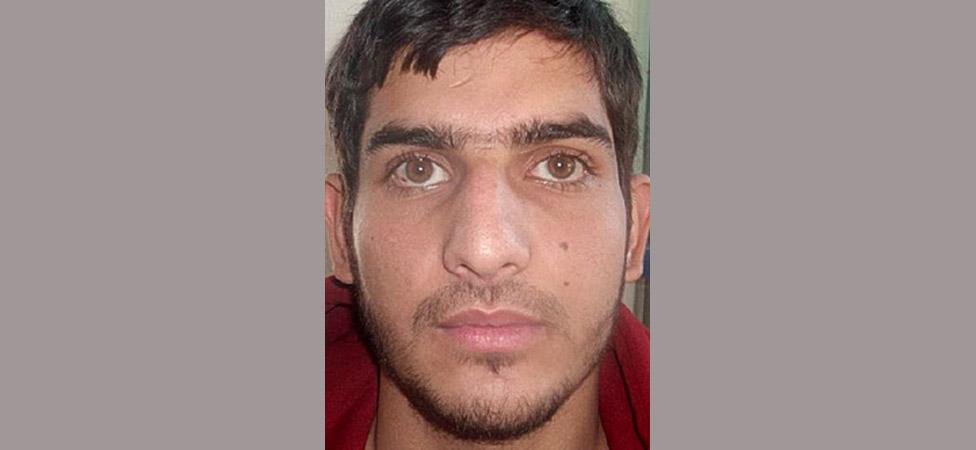Paris attacks: Video 'shows ninth attacker'
- Published

The French National Assembly was lit in the colours of the French flag on Tuesday - as was the Eiffel Tower
French security sources say that surveillance video shows a possible ninth assailant during Friday's attacks in which 129 people died.
The video reportedly shows a third figure in the car carrying the group which attacked several bars and restaurants.
It is not clear if this ninth attacker is one of two suspected accomplices detained in Belgium or is on the run.
The so-called Islamic State (IS) group has said it carried out the attacks.
The attacks also left more than 400 people wounded, with 221 still in hospital, 57 of them in intensive care.
European countries are on high alert. On Tuesday evening, a football friendly between Germany and the Netherlands was cancelled shortly before kick-off and the stadium in Hanover evacuated after "concrete" information about a bomb threat, according to the city's police chief.
Part of Hannover railway station was also closed while a suspicious object was investigated.

Police are investigating a car thought to have been used by the attackers
Earlier on Tuesday, police searched premises they believe were used by the attackers.
A car rented by Salah Abdeslam, the suspected eighth gunman who is now the subject of an international manhunt, is also being inspected.
The Belgian-registered black Renault Clio was found parked near Montmartre in northern Paris.
Investigators believe the car may have been used to bring the attackers to and from Belgium, from where French authorities say the attacks were organised.

More on the Paris attacks
What happened in Paris? How events unfurled on Friday evening in the French capital
Hollande upstages opposition - French president's tougher line on counter-terrorism
Who were the victims? Details of some of the 129 people killed
The fight against Islamic State Can a modern, open Western capital ever be totally secure?
Most wanted: Alleged mastermind Profile of key suspect Abdelhamid Abaaoud

Either Salah Abdeslam or his brother Brahim, named as another attacker, are thought to have rented a flat and two hotel rooms.
Images on French media of one of the hotel rooms being examined show syringes and tubes which could be bomb-making equipment.
Footage from Le Point purportedly shows Paris attack suspect Salah Abeslam's hotel room

New pictures of suspect Salah Abdeslam have been released
Salah Abdeslam is believed to have fled across the border to his native Belgium. Belgian police have released more pictures of him.
French police have also appealed for help, external to identify a man whose image has previously been circulated as one of the attackers who died at the Stade de France stadium.
A Syrian passport in the name of Ahmad al-Mohammad was found next to him, but authorities believe this was a fake.

French police have issued an appeal to help establish the identity of this man
As well as the attackers themselves, investigators are also reported to be focusing on a Belgian of Moroccan descent who is described as the possible mastermind of the attacks.
Abdelhamid Abaoud, 27, lived in the Molenbeek neighbourhood of Brussels, as did two of the attackers, and is now believed to be based in Syria, where he has risen through the ranks of IS.
In response to the attacks, France said it launched fresh raids on IS targets in Syria on Tuesday evening.
Ten French warplanes targeted IS's Syrian headquarters in Raqqa, Defence Minister Jean-Yves Le Drian told French TV.
Russia has also stepped up its attacks on IS targets in Syria, dispatching long-range bombers and firing a volley of cruise missiles.
The strikes follow a statement by Russia's security chief that a bomb brought down a Russian airliner over Egypt last month, killing all 224 people aboard.
On Wednesday President Francois Hollande is due to present plans to extend the state of emergency declared after the attacks by three months.
Other measures proposed by Mr Hollande include:
Changes to the constitution to allow the government to revoke citizenship of any convicted terrorists of dual nationality. Currently only those born outside France and later naturalised can lose their citizenship
Measures to speed up the expulsion of foreign nationals considered a threat to public order
Budget increases and extra recruitment to security forces and judiciary

What is Islamic State?
IS is a notoriously violent Islamist group which controls large parts of Syria and Iraq. It has declared its territory a caliphate - a state governed in accordance with Islamic law - under its leader Abu Bakr al-Baghdadi.
What does it want?
IS demands allegiance from all Muslims, rejects national borders and seeks to expand its territory. It follows its own extreme version of Sunni Islam and regards non-believers as deserving of death.
How strong is IS?
IS projects a powerful image, partly through propaganda and sheer brutality, and is the world's richest insurgent group. It has about 30,000 fighters but is facing daily bombing by a US-led multi-national coalition, which has vowed to destroy it.

Were you in the affected areas on Friday? Do you have any information you can share? You can get in touch by emailing haveyoursay@bbc.co.uk, external.
Please include a contact number if you are willing to speak to a BBC journalist today. You can also contact us in the following ways:
WhatsApp: +44 7525 900971
Tweet: @BBC_HaveYourSay, external
Send pictures/video to yourpics@bbc.co.uk, external
Text an SMS or MMS to 61124 or +44 7624 800100